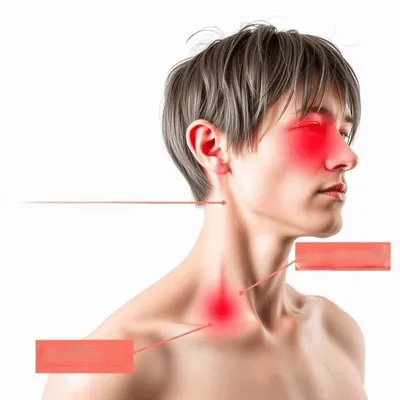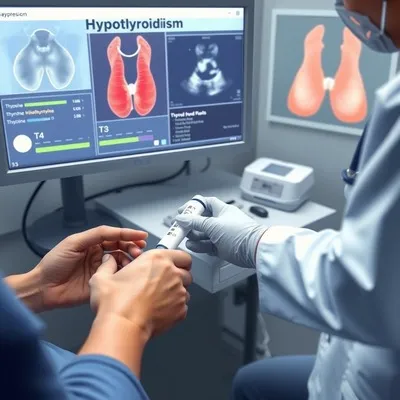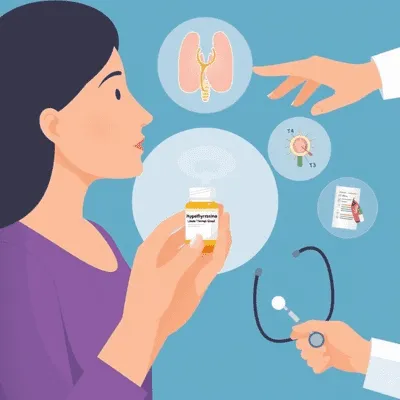Hypothyroidism is also known as underactive thyroid is basically a common medical disorder affecting millions of people globally. This disease develops when the thyroid gland fails to generate enough thyroid hormones. This gland is a tiny butterfly shaped and is located near the base of the neck. Now try to understand what the importance of this thyroid hormone is. These hormones are really important in order to control the metabolism of the body, energy level and overall performance of various functions. Due to the limited production of thyroid hormone, it can result in a variety of medical issues. That’s why the quality of life of that particular person is affected to a greater extent. This comprehensive article is all about. Here we will discuss causes, symptoms and treatment options in case of hypothyroidism. Let’s have a look.
What is Hypothyroidism?
As we have mentioned earlier, hypothyroidism is a medical disorder where the thyroid gland fails to generate sufficient amounts of thyroid hormones especially thyroxine T4 and triiodothyronine T3. The major function of these hormones is to control metabolic activities of the body. These hormones determine how energy is used and temperature of the body is maintained? These also regulate the functions of heart and muscle that how they perform. When the thyroid gland does not function properly, the metabolism of the body slows down; consequently it can result in different health issues.
Hypothyroidism is more common in women as compared to men, particularly those women who are above 60 years of age. It can affect people of any age, even young babies, children and men.
Causes of Hypothyroidism
There can be various factors that can cause hypothyroidism. So it is very important to identify these causes for early and effective diagnosis and better treatment. The most common and important root causes of hypothyroidism are as follows.
Autoimmune Disease
One of the major reasons to create hypothyroidism is Hashimoto’s thyroiditis which is actually an autoimmune medical condition. In this disorder the immune system starts to attack the thyroid gland as a mistake. This chronic or ongoing inflammation weakens the thyroid gland, that’s why its capacity to generate thyroid hormones also reduces. Hashimoto’s thyroiditis is more common in women as compared to men and sometimes it occurs in families as well that shows a genetic background.
Thyroid Surgery
Another reason that can create hypothyroidism is thyroid surgery. Sometimes it becomes essential to remove thyroid gland through surgical process in order to treat thyroid cancer, hyperthyroidism or goiter. In this case when a large portion or the whole thyroid gland is removed, the ability of the body to produce thyroid hormones reduces to a greater extent. That’s why a condition comes into existence that is called hypothyroidism.
Radiation Therapy
Thyroid gland can be damaged in case of radiation treatment for certain parts of the body like head and neck cancer. It can also be damaged through radioactive iodine therapy in order to treat hypothyroidism. In this whole process the capacity of the thyroid gland to generate hormones also decreases. It is important to understand here that this damage can create hypothyroidism even after years of treatment.
Medicines
Research has shown that some medicines such as lithium and amiodarone can create problems with the production of thyroid hormone. This situation can be the reason for hypothyroidism. Those people who are using these medicines must go for regular checkups in order to perform thyroid function tests.
Congenital Hypothyroidism
Congenital hypothyroidism can be the reason for hypothyroidism in some cases. This type of disorder actually occurs at that time when the thyroid gland of a baby is inactive at birth. The reason behind this can be genetic factors, abnormal creation of the thyroid gland or the lack of enzyme that affects the production of the hormones. So it is very important to diagnose it at its early stage for better treatment.
Iodine Deficiency
Iodine is an essential part of thyroid hormones and its shortage can create hypothyroidism. Medical research has shown that the shortage of iodine is uncommon in developed countries. It is because in these countries the food consumption and availability of iodized salt is better as compared to developing countries. But despite the fact, it is still a major cause of hypothyroidism in some parts of the world.
Pituitary Gland Disorders
Pituitary gland actually controls the thyroid gland by releasing hormones that stimulate the thyroid and is located near the base of the brain. The issue starts arising at that time when the pituitary gland does not create enough thyroid stimulating hormones. When this happens the thyroid gland cannot produce the required amount of thyroid hormones, this situation actually results in hypothyroidism. This particular disorder is medically known as secondary hypothyroidism which is less common as compared to primary hypothyroidism.
Symptoms of Hypothyroidism
It is very important to understand that symptoms of hypothyroidism can be different from person to person due to the level of hormone shortage and duration of that particular disease. Here in this part of the article we will talk about how identifying early symptoms is very important for better and effective treatment. Let’s have a look.

Fatigue
An affected person from hypothyroidism can experience tiredness which is chronic in nature. Affected people most of the time feel exhausted and tired even after getting enough sleep and rest. Besides that, they mostly find it difficult to stay active and focused throughout the day.
Weight Gain
Illogical weight gain is another symptom and cause of hypothyroidism. Why a person increases their weight is an important question at the moment. It is because of the low level of thyroid hormone that actually creates this disorder. The important thing that you have to understand here is that weight can be increased even if a person is taking regular exercise or consuming a low calorie diet.
Cold Intolerance
The research has stated that those people who are suffering from hypothyroidism can be more sensitive to cold temperatures. These types of people mostly feel cold even in warm environments and their hands and feet can be icy when touched.
Dry Skin and Hair
Hypothyroidism can cause dry, rough skin and fragile hair. Hair loss is also a common condition in this case and people can also experience weakening of their eyebrows, especially on the outer edges.
Constipation
Slow metabolic processes can also damage the digestive system which can lead to severe constipation. Remember this symptom is one of the first signs in case of hypothyroidism.
Depression and Mood Changes
According to research it is found that hypothyroidism can affect your mental health. Those people who have less active thyroid are at higher risk to develop depression, anxiety and mood changes. There is good news for you because these symptoms can get better with proper treatment.
Muscle Weakness and Joint Pain
Due to the lower level of thyroid, an affected person can feel weakness and pain in muscles and joints. There are also chances to develop carpal tunnel syndrome in some of the cases. This is actually a type of disease where a person feels the sensation of tingling in their hands.
Menstrual Abnormalities
According to medical science it is observed that some women can experience irregularities in their menstrual cycle due to hypothyroidism. These menstrual irregularities can be different such as heavier or longer periods, inconsistent phases or missed periods. Hypothyroidism can also create infertility and difficulties during childbirth.
Cognitive Disorder
Cognitive issues sometimes are called brain fog and can create memory issues, difficulty in concentration and slower thinking. These cognitive conditions can be frustrating and no doubt about it that they can affect your daily routine and overall quality of life.
Goiter
In some of the cases the thyroid gland can expand and when this happens a disorder comes into existence which is called goiter. This expansion of the thyroid gland can create obvious swelling in the neck along with pain and difficulty in swallowing.
Diagnosing of Hypothyroidism
This is a very important part of your article because effective diagnosis means better treatment. Here in this case of diagnosing hypothyroidism, the process actually consists of three steps, clinical examination, medical history and laboratory testing. If a professional healthcare provider detects the presence of hypothyroidism according to your provided symptoms and physical examinations, mostly blood tests are taken in order to check out the level of thyroid. So in this case the following important diagnostic tests are taken. Let’s have a look.

TSH Test
Thyroid stimulating hormone test which is mostly known as TCH test is used in order to diagnose hypothyroidism. This method is considered as one of the most effective ways of identifying hypothyroidism. The increase in TSH level indicates that the pituitary gland is releasing more thyroid stimulating hormone. It can be an effort to stimulate an underdeveloped thyroid gland in order to produce more hormones.
Free T4 Test
This special test is taken in order to detect the amount of free thyroxine T4 in the blood. In most of the cases T4 levels remain low that indicates the thyroid gland is producing fewer hormones.
T3 Test
Most T3 levels are not usually low in hypothyroidism but can provide more information about the functioning of thyroid.
Thyroid Antibody Tests
In those cases where autoimmune thyroiditis is suspected, thyroid antibody tests are helpful in order to diagnose hypothyroidism such as antithyroid peroxidase antibodies tests.
Treatment Options for Hypothyroidism
The major purpose of hypothyroidism treatment is to bring back normal thyroid hormone levels and reduce its symptoms. In this context, thyroid hormone replacement therapy is considered one of the most common and successful treatment options. Let’s talk about one by one.

Thyroid Hormone Replacement Therapy
In this treatment option, levothyroxine is given once a day mostly on an empty stomach. This is done in order to make sure of its full absorption. The special dose is adjusted according to the age, weight, complexity of hypothyroidism and any associated medical issues. In this scenario it is very important to monitor TSH level on a regular basis in order to make sure its proper quantity and prevent over or under treatment.
Diet and Lifestyle Changes
It is a fact that medicine is an essential component in order to treat hypothyroidism but with the change of diet and lifestyle you can also improve symptoms of this particular disease and also your overall health. You just only need to follow expert guidelines in the following.
Sufficient Iodine Consumption
In order to promote thyroid functions, it is very important to take a sufficient amount of iodine in your diet. For this purpose it is better to consume iodized salt, eggs, dairy products and shellfish. However it is also important to avoid excessive consumption of iodine because it can add difficulties in thyroid disease.
Balanced Diet
Balanced diet has been a hot favorite topic in our previous articles because it is not only required for this particular disease but also important for your overall quality of life. Try to consume those diets in your daily routine that are rich in fruits, vegetables, lean proteins, whole grains and healthy fats. By doing this you can get enough energy which is required in order to perform your functions of the body in a consistent way.
Regular Exercise
You can overcome tiredness and weakness with the help of regular physical activities. It not only helps you to reduce fatigue but also enhances your mood and is necessary in weight management as well.
Stress Management
Remember stress is the biggest hindrance in the way of your healthier life. Chronic stress can affect the thyroid functions. So it becomes really important to implement stress reducing techniques such as yoga, meditation or deep breathing exercises for getting desired results.
Monitoring and checkups
It is really important for a person who has hypothyroidism to monitor and go for regular check up to your professional healthcare provider. Maintaining TSH level and changing the quantity of thyroid hormone replacement treatment is really crucial in order to make sure that the thyroid functions are performing in a normal way and symptoms are under control.
Treatment of Special Populations
There is special treatment required for special people. For example, a pregnant woman who has hypothyroidism needs special care because untreated hypothyroidism can create issues during pregnancy such as early delivery, low birth weight and delays in the development of the kids. There is a need for a higher dosage of levothyroxine to pregnant women in order to keep their thyroid hormone level in a normal position.

There is an important thing that you have to keep in mind that those babies who have congenital hypothyroidism should start thyroid hormone replacement treatment as early as possible in order to make sure that they grow and develop in the right way. As the child develops, there is a need for regular monitoring and dosage changes.
Conclusion
Hypothyroidism is a common but controllable disease that requires early diagnosis and timely treatment in order to avoid complications and enhance the quality of life. It becomes very important to understand its reasons and identify its symptoms for getting better medical treatment. Those people who are suffering from hypothyroidism can live healthier by implementing some important methods. Thyroid hormone replacement therapy, changes in diet and lifestyle and regular monitoring are some measures that you can take in order to reduce symptoms of hypothyroidism to a greater extent.
